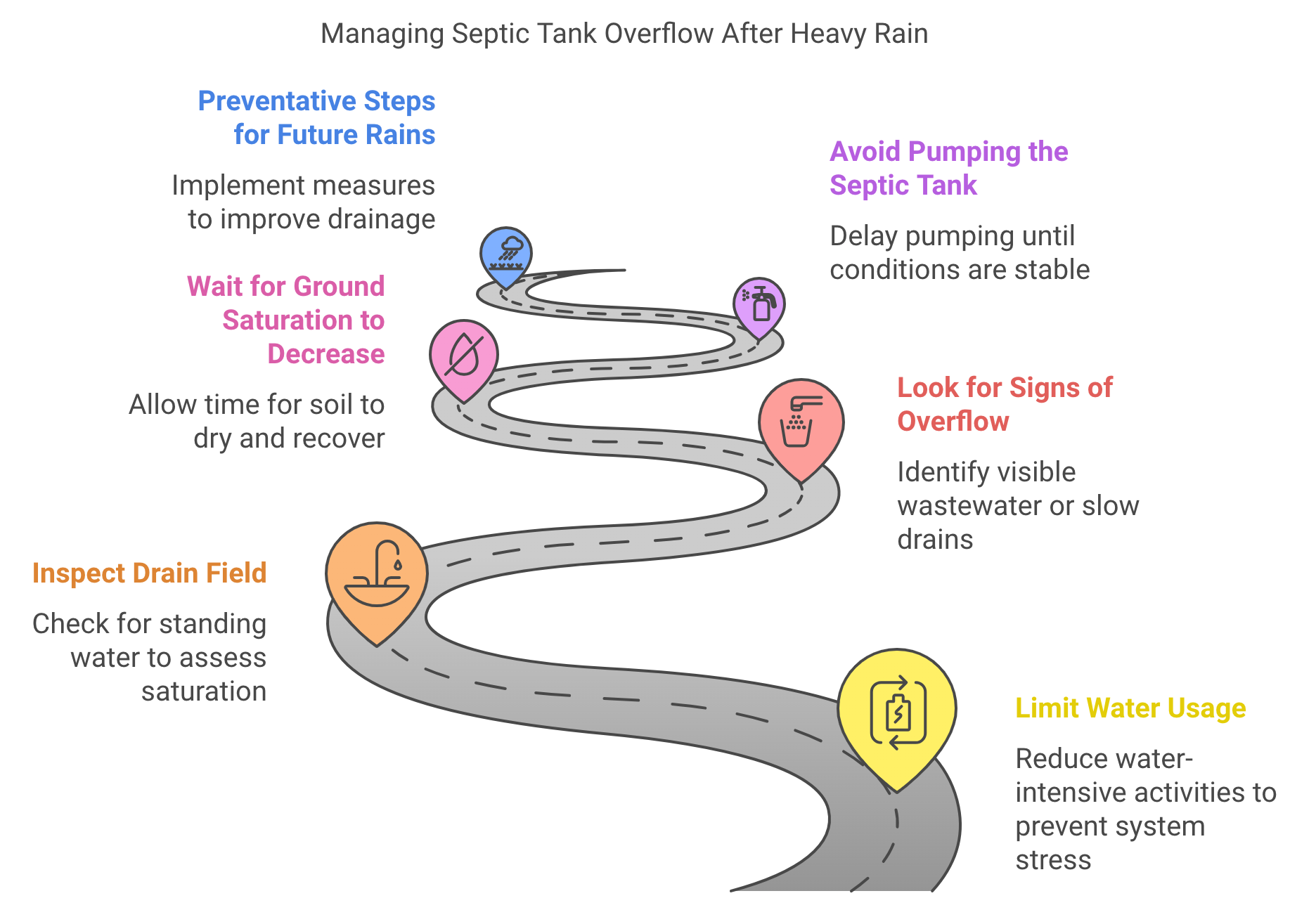What to Do if Your Septic Tank Overflows After Heavy Rain
Septic tank overflow after heavy rain can be a messy and challenging issue. When rainfall saturates the ground, it can prevent your septic system from working correctly, leading to potential overflows. In this guide, we’ll explain why septic tanks overflow in heavy rain, what steps you can take, and answer common questions to help you manage and prevent future issues.
Why Septic Tanks Overflow After Heavy Rain
When heavy rains soak into the ground, the soil surrounding a septic tank and drain field can become saturated. This saturation prevents wastewater from dispersing effectively, causing it to back up in the tank. As a result, the tank may overflow, creating potential health hazards and even damage to your septic system if left unchecked.

Steps to Take if Your Septic Tank Overflows After Heavy Rain
Click here to prevent your septic system from overflowing
Limit Water Usage
Reducing water usage inside your home is one of the most immediate actions you can take. Cutting back on water-intensive activities—like laundry, dishwashing, and long showers—will prevent additional stress on your already overwhelmed system. Until the ground dries out and the septic system stabilizes, limit water use to essential needs.
Inspect the Drain Field for Flooding
Take a walk around your drain field (the area where wastewater is dispersed) to check for standing water. If you see pooling, this is a sign of saturation, meaning the soil can’t absorb more water. Avoid walking on the area, as this could compact the soil further, making it harder for the water to drain.
Look for Signs of Overflow Around the Tank
Examine the area around your septic tank for any signs of overflow, such as visible wastewater or damp soil. Indoors, you might also notice slow drains or unusual gurgling sounds from your plumbing. Both are indicators that the system is backed up and struggling to function.
Wait for Ground Saturation to Decrease
Once the rain stops, give the ground a few days to dry out. As the soil recovers, the septic system may return to normal. During this time, monitor the drains in your home to see if they begin working efficiently again. In most cases, waiting for the ground to dry will alleviate the issue.
Avoid Pumping the Septic Tank Right Away
While it may seem logical to pump the tank immediately, doing so in saturated conditions could make things worse. If the ground is still waterlogged, the tank may refill quickly, or worse, the tank itself could shift or even float if the surrounding soil is too wet. Instead, wait until the ground has dried before considering pumping.
Preventative Steps for Future Rains
To prevent future issues, consider improving the drainage around your septic system. Adding swales or French drains can help divert rainwater away from the drain field, reducing the risk of saturation. Additionally, regular septic system inspections and maintenance will help your system stay in peak condition and better equipped to handle heavy rainfall.
FAQ: Common Questions About Septic Tank Overflow After Rain
Is it normal for a septic tank to overflow after heavy rain?
Yes, it’s not uncommon for septic tanks, especially in older systems or those in poor drainage areas, to overflow during heavy rain. Saturated soil can prevent the system from functioning correctly, causing a temporary backup.
How long should I wait before using water heavily in my home again?
It’s best to wait for several days of dry weather to allow the ground to recover. If the drains in your home start functioning normally again, this usually indicates that the system is stabilizing, and you can resume regular water use.
Should I pump the tank if it’s overflowing?
Generally, no. Pumping during or immediately after heavy rain can lead to further issues. If the ground is still saturated, the tank may refill quickly, and pumping could potentially damage the system. It’s best to wait until the soil dries out.
How can I tell if my septic tank needs professional attention after an overflow?
If the overflow persists even after dry weather returns or if sewage begins backing up into your home, it’s time to contact a septic professional. They can assess any damage to the system and determine if repairs are needed.
Can heavy rain permanently damage my septic system?
Repeated overflows or prolonged saturation can cause long-term damage to a septic tank and drain field. Over time, this can lead to reduced efficiency, clogs, and costly repairs. Regular maintenance and drainage improvements can help protect your system.
What’s the best way to prevent my septic system from overflowing in future storms?
Improving drainage around the drain field, reducing water usage during heavy rains, and scheduling routine septic inspections can help prevent overflows and ensure your system remains in good working condition.
- Why Your Septic Tank Smells When It Rains (and What to Do About It)
- How to Handle Water-Damaged Wood in Your Home or Business
- How to Prevent and Remove Mold from Pillows: A Complete Guide
- Why Is My Carpet Always Wet? A Step-by-Step Guide to Identifying the Source of Moisture
- Signs of Septic System Failure and What It Means for Your Basement
